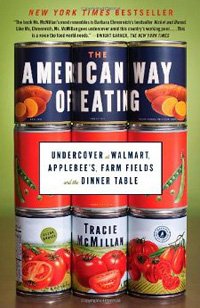Book Notes
 Tracie McMillan, The American Way of Eating (New York: Scribners, 2012), 319pp.
Tracie McMillan, The American Way of Eating (New York: Scribners, 2012), 319pp.
Tracie McMillan is no food snob. She grew up near Flint, Michigan. Since her mother was an invalid, her dad did his best with the cooking, and McMillan isn't ashamed to say that Tuna Helper was one of her favorites. As she grew older, she began to think about a glaring "paradox of plenty" in American eating. To eat a healthy diet has become expensive, time consuming, and difficult, whereas to eat a bad diet has become cheap and easy. "Our agriculture is abundant, but healthy diets are not."
To explore this conundrum, McMillan went underground as an investigative journalist to learn how America grows, sells, and eats its food. She spent two months each in three different jobs. In California she worked with migrant workers to pick grapes, sort peaches, and cut garlic. In Michigan she worked at two Walmarts on the overnight shift stocking shelves and in the fresh produce section. In Brooklyn she worked as an "expediter" at an Applebee's restaurant. She admits that this was an artificial rather than an authentic experience, but nonetheless, in each job she "lived and ate off the wages I earned, paying rent and buying groceries as if it were, in fact, my real life."
Her story is mildly schizophrenic. Sometimes she focuses on the workers, who in these jobs are underpaid, cheated, work in unsafe places, and enjoy little training or benefits. And the bad thing about these jobs is that they are probably "good" jobs for unskilled people who are a sort of permanent under class. At other times the focus is on the food, how it's grown, shipped, processed, etc. Walmart, for example, is now the largest grocer in the world, and largest employer in the US; it sells twice as much food as its next three competitors combined. And farmers markets? They sell about 1% of the food we buy.
A small minority of Americans can buy heirloom tomatoes at Whole Foods and read books by Michael Pollan. McMillan shows that most Americans are trapped in a system of food deserts and processed foods that makes it hard to eat healthy. Her book brings to mind the recent movie about American hunger called A Place at the Table, and similar books of investigative journalism like Working in the Shadows: A Year of Doing the Jobs Most Americans Won't Do by Gabriel Thompson, and Nickle and Dimed; On Not Getting By in America by Barbara Ehrenreich. America boasts that it's the largest food producer in the world; but many if not most if its citizens enjoy few benefits from this distinction.


